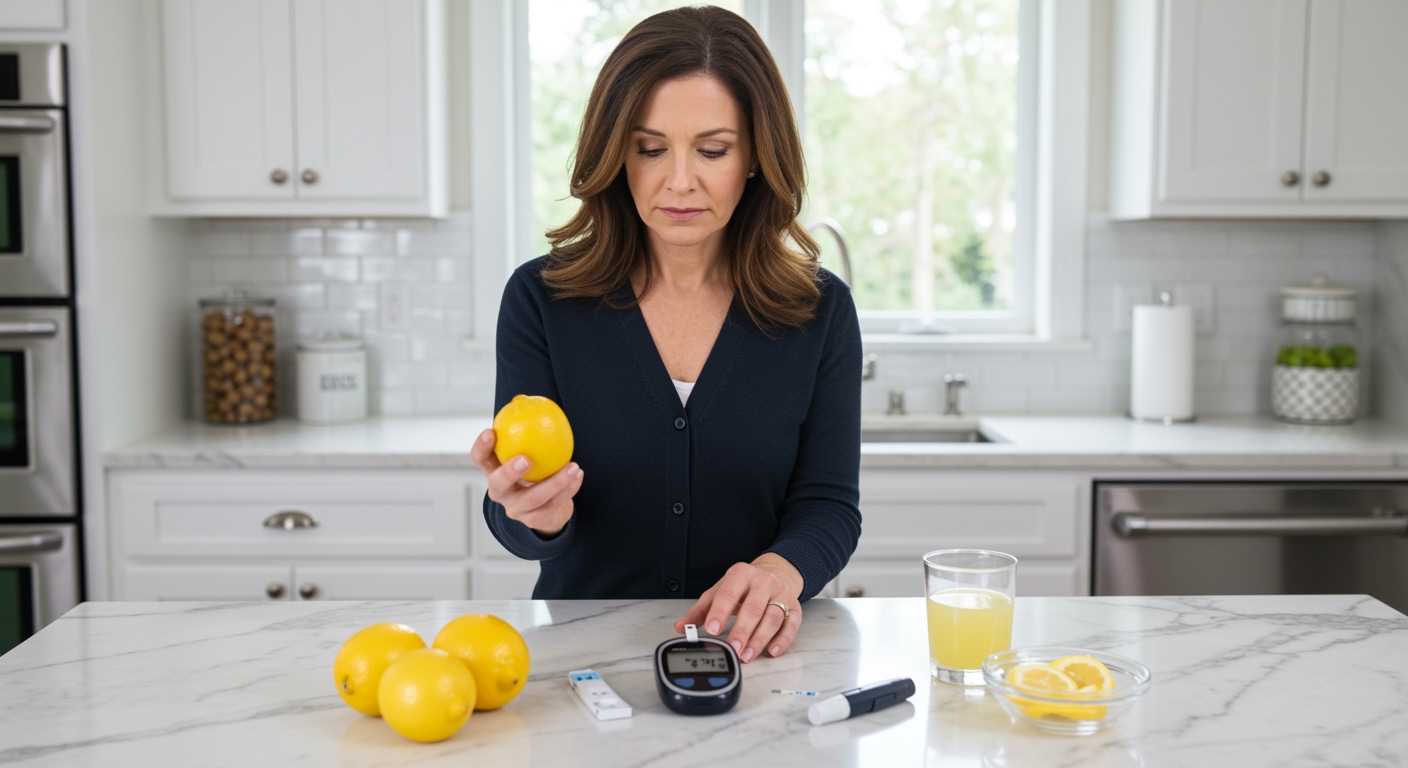✪ Key Takeaway: Lemons are generally safe for diabetes due to their low glycemic index and minimal impact on blood sugar levels.
Introduction
Your doctor just told you that you have diabetes, and suddenly every food choice feels like walking through a minefield.
You might be wondering if that morning lemon water or the squeeze of citrus on your fish is now off-limits because of your blood sugar concerns.
Hi, I’m Abdur, your nutrition coach, and today I’m going to explain exactly how lemons affect your blood sugar and whether you can safely include them in your diabetes management plan.
Do Lemons Raise Blood Sugar Levels?
Lemons have a glycemic index of approximately 25, which places them firmly in the low-glycemic category.
This means they cause a minimal rise in blood glucose compared to high-glycemic foods like white bread or candy.
One medium lemon contains only about 5 grams of carbohydrates and 1.6 grams of sugar, making it one of the lowest-carb fruits available.
The fiber content in lemons, though modest at 1.6 grams per fruit, helps slow down sugar absorption in your digestive system.
When you consume lemon juice or whole lemon, the natural fiber and citric acid work together to prevent rapid spikes in blood glucose.
Research shows that citric acid can actually delay gastric emptying, which means food moves more slowly from your stomach to your small intestine, resulting in a more gradual release of glucose into your bloodstream.
✪ Fact: One whole lemon has fewer carbs than a single grape, making it extremely diabetes-friendly.
Can Lemon Juice Actually Help Control Blood Sugar?
Studies suggest that lemon juice might actually improve glucose tolerance when consumed with meals.
The mechanism involves citric acid interfering with alpha-amylase, an enzyme responsible for breaking down starches into simple sugars in your mouth and small intestine.
When alpha-amylase activity is reduced, complex carbohydrates are digested more slowly, leading to a blunted glucose response after meals.
Research published in the European Journal of Nutrition found that adding lemon juice to white bread reduced the glycemic response by approximately 30%.
The polyphenols in lemons, particularly hesperidin and diosmin, may also enhance insulin sensitivity at the cellular level.
These compounds help your muscle and liver cells respond more effectively to insulin, allowing for better glucose uptake and utilization.
✪ Pro Tip: Add fresh lemon juice to starchy meals to potentially reduce their impact on your blood sugar.
What About Lemon Water for Diabetes?
Lemon water is essentially calorie-free and contains virtually no carbohydrates that would affect blood sugar.
The juice from half a lemon in a glass of water provides less than 2 grams of carbohydrates, making it a safe beverage choice for people with diabetes.
Staying properly hydrated is crucial for diabetes management because dehydration can actually cause blood sugar levels to rise.
When you’re dehydrated, your blood becomes more concentrated, leading to higher glucose readings even if you haven’t eaten anything.
Lemon water can help you maintain adequate fluid intake while providing a refreshing alternative to plain water.
The vitamin C in lemon water may also provide additional benefits for people with diabetes, as this antioxidant helps reduce inflammation and oxidative stress associated with high blood sugar.
✪ Note: Avoid adding sweeteners to lemon water as they can negate the blood sugar benefits.
Are There Any Risks of Eating Lemons with Diabetes?
While lemons are generally safe for diabetes, there are a few considerations to keep in mind.
The acidity in lemons can potentially interact with certain diabetes medications, particularly those that affect stomach acid production.
If you take medications like metformin, the citric acid might enhance absorption, potentially leading to stronger effects than expected.
People with gastroparesis, a common diabetes complication that slows stomach emptying, should be cautious with acidic foods like lemons.
The acid can irritate an already sensitive digestive system and potentially worsen symptoms like nausea and bloating.
Dental health is another concern, as the citric acid can erode tooth enamel over time, especially if you sip lemon water throughout the day.
Always consult with your healthcare provider before making significant changes to your diet, including increasing your lemon consumption.
✪ Pro Tip: Drink lemon water through a straw to minimize contact with your teeth and protect enamel.
How Much Lemon Is Safe for Diabetics?
Most people with diabetes can safely consume the juice of one to two lemons per day without any negative impact on blood sugar.
This amount provides approximately 4-8 grams of carbohydrates, which is minimal in the context of a typical daily carbohydrate intake.
The key is to monitor your individual response by checking your blood glucose before and after consuming lemon products.
Some people may be more sensitive to citrus fruits due to individual variations in digestive enzymes and gut bacteria.
Start with smaller amounts, such as the juice of half a lemon, and gradually increase if your blood sugar remains stable.
Remember that portion control applies to all foods, even those that are generally considered diabetes-friendly.
Keep a food diary to track how different amounts of lemon affect your blood glucose patterns throughout the day.
✪ Fact: Your individual response to lemons may vary, so personal monitoring is more valuable than general guidelines.
The Bottom Line
Lemons are not only safe for people with diabetes but may actually provide benefits for blood sugar control when used appropriately.
The best approach to diabetes nutrition is not about restriction, but about making informed choices that support your health goals.
I’d love to hear about your experience with lemons and diabetes management, so please share your thoughts, questions, or personal stories in the comments below.
References
At NutritionCrown, we use quality and credible sources to ensure our content is accurate and trustworthy. Below are the sources referenced in creating this article:
- Healthline: Lemons and Diabetes
- Limoneira: Study: Lemon Juice Reduces the Glycemic Response
- PMC: Citrus Fruits and Diabetes Management
- Verywell Health: Benefits of Lemon and Diabetes





